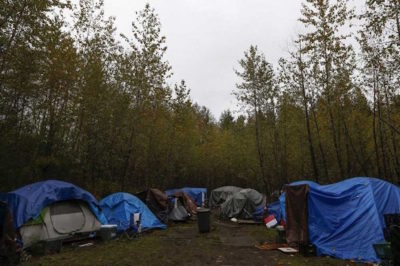California Lawmakers Approve $2 Billion Plan to Help the Homeless
 ICCNC: California lawmakers and Los Angeles officials advanced new measures to address the state’s large homeless population this week, including a $2 billion statewide plan passed Thursday to build more housing for homeless people who are mentally ill.
Street encampments and public safety fears surrounding people experiencing homelessness have become top political issues in urban centers up and down the West Coast as higher rents and home prices have put a squeeze on the poor.
ICCNC: California lawmakers and Los Angeles officials advanced new measures to address the state’s large homeless population this week, including a $2 billion statewide plan passed Thursday to build more housing for homeless people who are mentally ill.
Street encampments and public safety fears surrounding people experiencing homelessness have become top political issues in urban centers up and down the West Coast as higher rents and home prices have put a squeeze on the poor.
The California legislative plan was the most significant move by lawmakers to address the state’s burgeoning homeless crisis since California’s budget deficits became annual surpluses.
The $2 billion will be spread out over several years. It boosts next year’s spending on homeless and affordable housing programs by $267 million, for a total of more than $3.6 billion.
Gov. Jerry Brown, who must sign the law, has said he supports the move.
The state vote came a day after the Los Angeles City Council approved language for a separate, $1.2 billion bond measure to combat homelessness in that city, which is expected to be put to city voters in November.
“This crisis is pervasive, it endangers public health and stifles economic prosperity,” said Mayor Eric Garcetti.
California’s homeless population accounted for about 20% of the U.S. homeless population last year, the most in any state. Close to 115,000 people in California were homeless in 2015, according to the U.S. Department of Housing and Urban Development, which compiles annual, one-night, city counts of people sleeping in shelters and streets.
The $2 billion plan will be paid for by a pre-existing tax on millionaires approved by voters in 2004, originally intended for mental health services. A two-thirds vote of the legislature was required to alter the use of that tax, requiring some Republican support.
The money from that tax will be used to build permanent supportive housing for the mentally ill who are homeless, or in danger of becoming homeless.
The plan’s sponsor, state Senate President Pro Tempore Kevin de León, of Los Angeles, said the program “will improve the quality of life in our communities and give hope to thousands of Californians currently living in despair across our state.”
Venues similar to Railton Place, an 110-unit facility run by the Salvation Army, could be a beneficiary of the funding. The center offers clean, austere rooms, as well as transitional and permanent housing, in the heart of San Francisco’s gritty Tenderloin District. The center says it is in discussions with city officials on how it might be able to expand its programs with the funding.
The center offers services including case management, substance abuse counseling, mental health therapy, money management, and help with education and gaining employment.
Fletcher Chamley, 49, a Navy veteran who experienced severe bouts of drug addiction and homelessness for decades, has been living at the center since October 2015, where he receives mental health counseling, does volunteer work and will soon begin a job training program.
“What kind of a destiny we get really depends on the kind of decisions we make,” said Mr. Fletcher, adding he has been sober for five months with help from his case manager. “The Railton Place is the kind of place where you can actually get to that level where you can actually start making decisions.”
Write to Alejandro Lazo at alejandro.lazo@wsj.com

